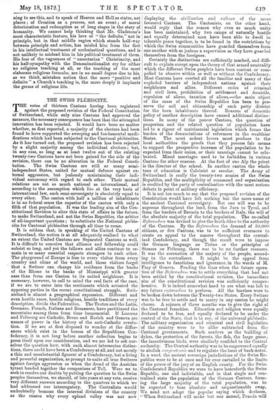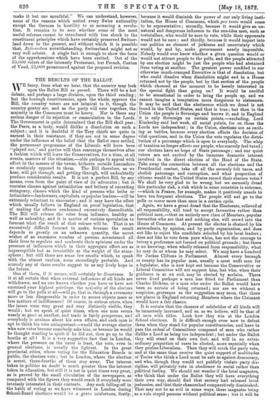THE SWISS PLEBISCITE. T HE votes of thirteen Cantons having been
registered against the proposed revision of the Federal Constitution of Switzerland, while only nine Cantons had approved the measure, the necessary consequence has been that the attempted innovation has been rejected. It would have been no matter whether, as first reported, a majority of the electors had been found to have supported the sweeping and fundamental modi- fications which had been subjected to the Cantonal plebiscites. As it has turned out, the proposed revision has been rejected by a slight majority among the individual electors ; but, in any case, so long as at least twelve out of the existing twenty-two Cantons have not been gained for the side of the revision, there can be no alteration in the Federal Consti- tution. The Swiss Cantons are still so many semi- independent States, united for mutual defence against ex- ternal aggression, but jealously maintaining their indi- vidual autonomy with regard to each other. Their mutual relations are not so much national as international, and according to the assumption which lies at the very basis of international law, each semi-sovereignty is absolutely equal to every other. The canton with half a million of inhabitants is in no federal sense the superior of the canton with only a fifth of that population. It was the leading aim of the Con- stitutional Revision to alter this state of affairs in the future, to make Switzerland, and not the Swiss Republics, the arbiter of all-important questions ; to substitute the National plebis- cite for Cantonal plebiscites through all time to come.
It is seldom that, in speaking of the United Cantons of Switzerland, the notion is at all adequately realised to what an extent the United Cantons are Separated Cantons as well. It is difficult to conceive that alliance and fellowship could subsist so long, and yet the fellows and allies continue to re- main in so many essential respects strangers to each other. The playground of Europe is free to every visitor from every country and clime of the world, and those visitors forget that a Switzer can change his residence from the banks of the Rhone to the banks of Mississippi with greater ease than from one Canton to its united neighbour. It is necessary, however, to call to mind the real facts of the case, if we are to enter into the sentiments which actuated the opposing parties in the recent constitutional struggle, Swit- zerland is almost a geographical expression. Different and even hostile races, hostile religions, hostile traditions of every description, divide the Federation. The Teuton and the Latin, Germans, French, Italians and Romanese, have partitioned the mountains among them from time immemorial. If Lucerne and Fribourg are Catholic, Berne and Zurich and Geneva are names of power in the history of the anti-Catholic revolu- tion. If we are at first disposed to wonder at the differ- ences which exist in the bosom of the Republican Con- federacy, it is not long before another reflection begins to press itself upon our consideration, and we are led to ask our- selves the question how, with such almost internecine distinc- tions, there could have been a Confederacy at all, and not merely a thin and unsubstantial figment of a Confederacy, but a living and powerful organization, as prompt to unite all true Switzers against foreign aggression as when the dread of the Austrian tyrant banded together the companions of Tell. Were we to seek to resolve our doubts by putting the question to the Swiss peoples themselves, we should, of late years at any rate, receive very different answers according to the quarters to which we had addressed our interrogatory. The Centralists would undoubtedly bemoan the internal divisions of the country as the reason why every upland valley was not now displaying the civilization and culture of the more favoured Cantons. The Cantonists, on the other hand, would reply that the reason why even so much unity has been maintained, why two camps of naturally hostile and equally determined men have been able to dwell in tolerable peace together, is to be found in the restrictions by which the Swiss communities have guarded themselves from one another with as jealous a supervision as they have guarded themselves from the foreigner.
Certainly the distinctions are sufficiently marked, and diffi- cult to explain except upon the theory of that armed neutrality which the different Swiss peoplets have been content or com- pelled to observe within as well as without the Confederacy- Most Cantons have erected all the familiar and many of the exploded barriers of independent nations against their neighbours and allies. Different codes of criminal and civil laws, prohibition of settlement and domicile, expulsion of aliens, taxation of aliens,—the main object of the mass of the Swiss Republics has been to pre- serve the soil and citizenship of each petty district for the born inhabitants thereof. Reasons of domestic policy of another description have caused additional distinc- tions. In many of the poorer Cantons, the question of pauperism and the related question of population have led to a rigour of matrimonial legislation which forms the burden of the denunciations of reformers in the wealthier States. The most ardent lovers must produce to the local authorities the proofs that they possess fair means to support the prospective increase of the population to be expected from their union, or their marriage cannot be cele- brated. Mixed marriages used to be forbidden in various- Cantons for other reasons. At the foot of one Alp the priest is the director of the school. In another canton the whole tone of education is Calvinist or secular. The Army of Switzerland is really the twenty-two armies of the Swiss Republics, and the multiplicity of command and organisation is credited by the party of centralisation with the most serious defects in point of military efficiency.
It is not too much to say that the proposed revision of the Constitution would have left nothing but the mere name of the ancient Cantonal sovereignty. But one will was to be supreme throughout the land, from the Jura to Tyrol, and from the borders of Bavaria to the borders of Italy, the will of the absolute majority of the total population. The so-called Referendum was devised to give the death-blow to the authority of the Cantons. By the Referendum the demand of 50,000 citizens, or five Cantons, was to be sufficient evermore to create an appeal to the masses throughout the central- ised Confederacy, and though the result were to impose the German language on Ticino or the principles of Strauss on Fribourg, there was to be no further resource. It was the coronation of the majesty of the people, accord- ing to the centralisers. It might be the appeal from intelligence to fanaticism and ignorance, in the words of M. Fazy of Geneva. Pending the time when the future opera- tion of the Referendum was to settle everything that had not been settled by the constitutional revision, the immediate aim of the constitutional revision was sufficiently compre- hensive. It is indeed somewhat hard to see what was left to any future referendum to perform. All the barriers were to be broken down between the Twenty-two States. Every Switzer was to be free to settle and to marry in any canton he might choose. A sojourn of three months was to give the right of the Cantonal franchise. Education and religion were equally declared to be free, and equally declared to be under the control of the State, that is to say, of the universal plebiscite. The military organization and criminal and civil legislation of the country were to be alike subtracted from the Cantonal governments. Such matters as the building of dykes, the protection of the forests, the fish, the large game, the insectivorous birds, were similarly confided to the Central authority. The Central authority was to be empowered equally to abolish rouge-et-noir and to regulate the issue of bank-notes- In a word, the ancient sovereign jurisdictions of the Swiss Re- publics were to be at once and for ever curtailed to the limits of the power of the jury of an English county. For the Swiss Confederated Republics we were to have henceforth the Swiss Republic, one and indivisible, and in that single and cen- tralised state the population of the German Cantons, form- ing the large majority of the total population, was to be expected to bear absolute and unquestionable sway. We need not adopt the popular saying which declares, " When Switzerland will make but one morsel, Prussia will
make it but one mouthful." We can understand, however, some of the reasons which united every Swiss nationality except the German in hostility to so menacing a revolu- tion. It remains to be seen whether some of the most useful reforms cannot be introduced with less shock to the constituent principles which have certainly preserved Switzer- land down to the present, and without which it is possible that, Referendum notwithstanding, Switzerland might not so very well subsist. A single fact is enough to show the force of the apprehensions which have been excited. Out of the 55,000 voters of the intensely Protestant, but French, Canton of Vaud, 53,000 pronounced against the proposed revision.



































 Previous page
Previous page